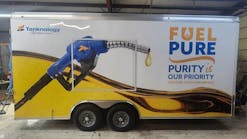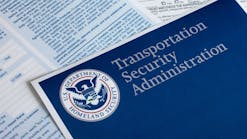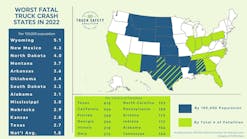Members of the House Homeland Security Committee recently introduced bipartisan legislation that would require the Transportation Security Administration (TSA) to streamline the application and renewal process for transportation workers who need multiple credentials, and establish a reduced fee structure.
If signed into law, the bill would bring relief for carriers, and the overall supply chain, says Ryan Streblow, president and CEO of National Tank Truck Carriers, which has had a long-standing goal of streamlining the process for securing the Hazardous Materials Endorsement (HME) and Transportation Worker Identification Credential (TWIC).
“It’s incredibly crucial, especially now,” Streblow insisted. “We’re facing, and continue to face, a workforce shortage.
“It makes the news all the time—and duplication is adding to the potential delays.”
Because of the commodities they haul, most tank truck carriers require drivers to hold a hazmat endorsement, and workers who need access to secure port facilities—which tank truck drivers often need to visit—must obtain a TWIC. Yet those credentials, along with the TSA PreCheck, which all require background checks, are applied for and issued separately, and come with their own fees and protracted wait times.
“I have heard from workers in my district who end up spending a significant amount of time and money to keep their credentials up to date—this process clearly needs to be fixed,” said Rep. Adam Smith, a Democrat from Washington, who introduced the bill along with Rep. John Katko, a Republican from New York.
“The bipartisan legislation introduced (Feb.2) will require TSA to make it easier and less costly for workers to maintain their credentials, taking some of the burden off our transportation workers who are critical to keeping our economy running. I appreciate ranking member Katko for working with me on this commonsense bill.”
Currently, obtaining an HME can take months. Delays force carriers to extend training programs unnecessarily, and cause trainees who grow tired of waiting to go elsewhere to make money, Streblow said. “Then the industry and our economy suffer because we don’t have individuals adding to the supply chain and delivering commodities,” he added.
In addition to simplifying the process for transportation workers applying for multiple TSA credentials, the Security Threat Assessment Application Modernization Act will require TSA to establish a reduced fee structure. Most importantly, proponents say, the legislation does not modify the back-end security assessment conducted on individuals, ensuring they must submit to the same level of scrutiny as currently required by law.
“We need to remove unnecessary bureaucratic hurdles that burden our transportation workers from doing their important jobs,” Katko maintained. “Our transportation sector is imperative to our economic recovery from the pandemic, and this legislation eliminates redundant and costly requirements.”
Several transportation and industry organizations joined NTTC in support of the bill, including the American Trucking Associations.
“This critical legislation will standardize and streamline the enrollment process for individuals applying for multiple Transportation Security Administration Security Threat Assessment programs, relieving truck drivers of duplicative fees and redundant background checks, and empowering them to meet the needs of supply chains moving hazardous materials and operating in secure facilities,” said Edwin Gilroy, ATA’s senior vice president of legislative affairs.
Other organizations that support the bill include the Transportation Trades Department, AFL-CIO; Teamsters; Washington Trucking Associations; American Short Line & Regional Railroad Association; Association of American Railroads; Border Trade Alliance, and Owner-Operator Independent Drivers Association.
“The American supply chain crisis is now a prominent topic of national conversation, and NTTC firmly believes that this legislation is one crucial step needed to resolve logistics inefficiencies by streamlining background checks needed by certain truck drivers,” Streblow concluded.










